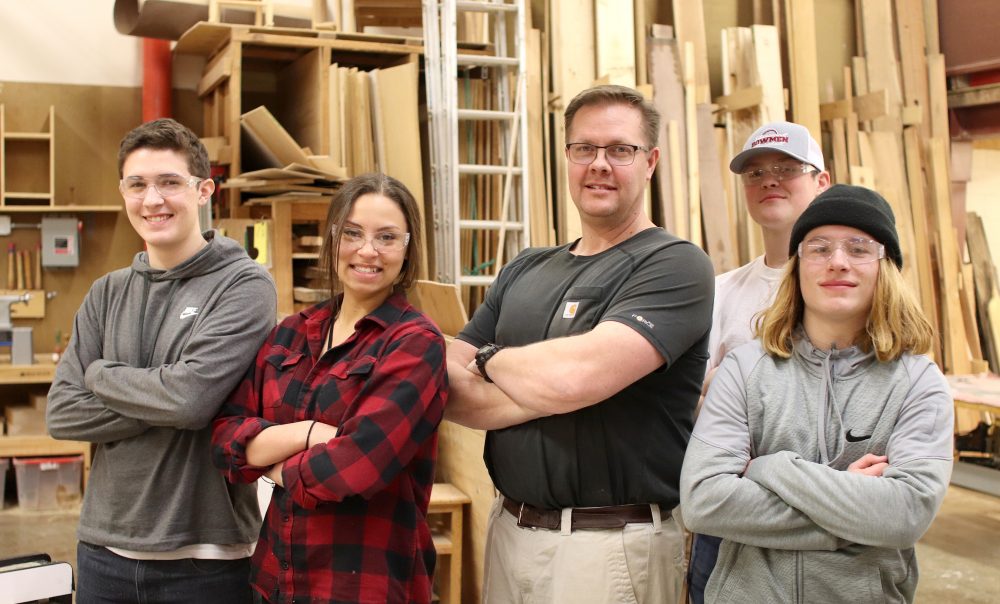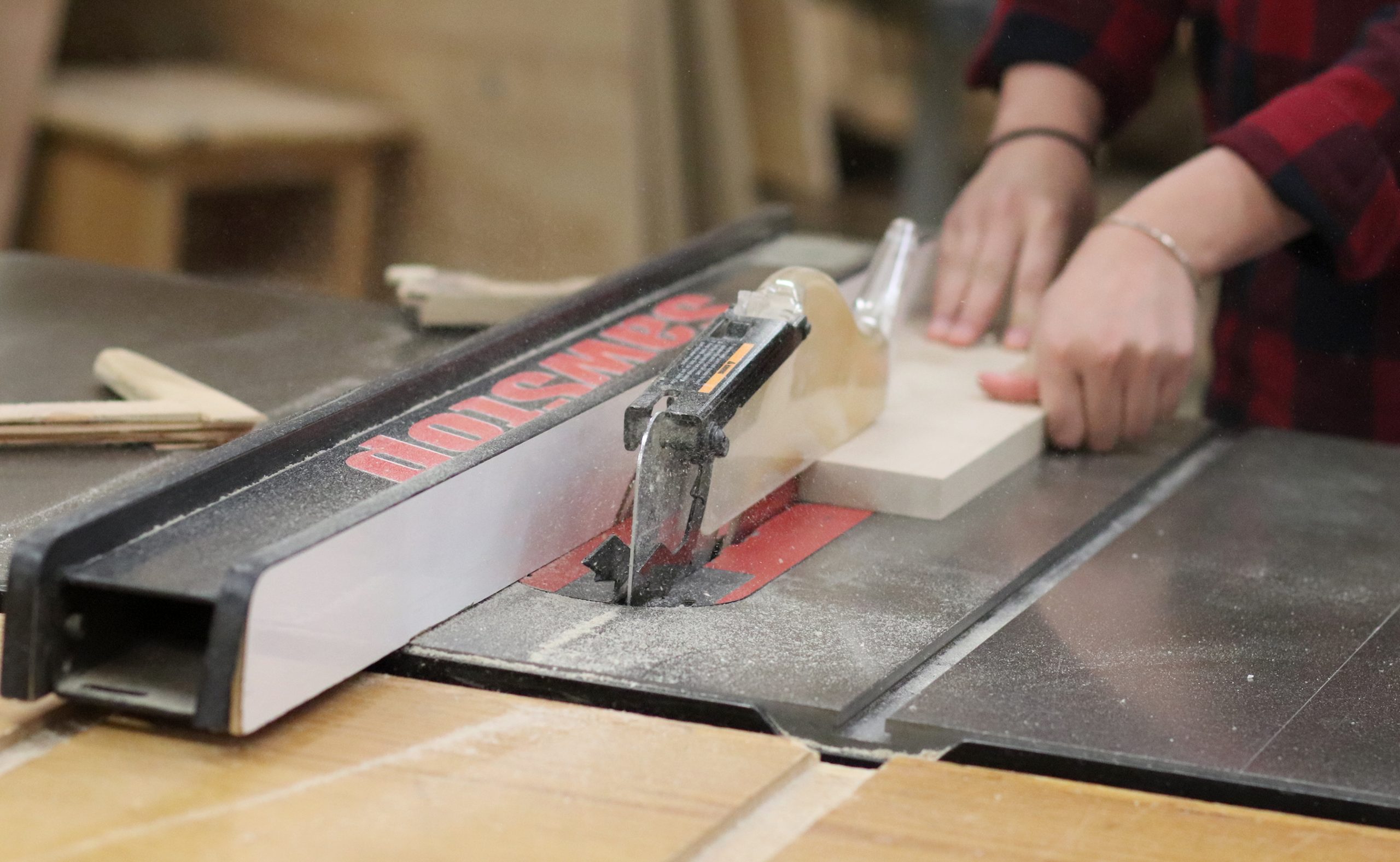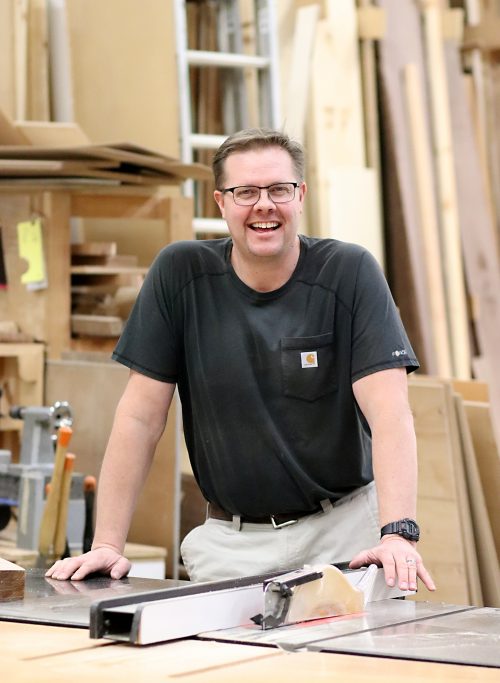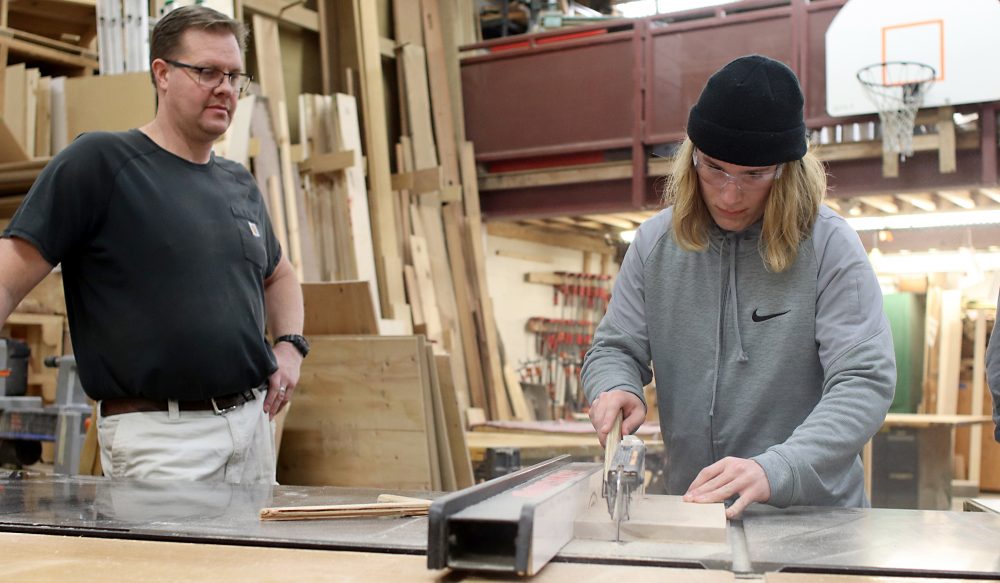This content was published: March 9, 2020. Phone numbers, email addresses, and other information may have changed.
PCC’s Dual Credit Program is creating avenues to higher education for high school students
Photos and story by James Hill

The Build Squad: Sherwood High’s dual credit building construction class includes students Dane Baysinger, Natalie Kapuniai-Ryan, Christian Emmons and Alex Block with teacher Jon Dickover (center).
Sherwood High School senior Christian Emmons wants to follow in his father’s footsteps to become an electrician. But being in high school, options for learning the basics of the profession were few and far between until he discovered the world of dual credit.
Now, Emmons is taking classes through Portland Community College’s Dual Credit Program, which partners with high schools to provide their students with free college-level classes. The 18-year-old is in his high school’s Building Construction Program and is learning the finer points of the trades through its Bowmen House Project, where students design and help build a residential home.

PCC Dual Credit
- Portland Community College provides the opportunity for high school students to earn college credit while still in high school. Students like the ones at Sherwood High School’s Building Construction Program complete PCC-approved courses taught at their high school and earn college credit for free.
“I always thought it would be super cool to learn a little bit more about what they were doing (on the Bowmen House),” Emmons said. “I wanted to be around the framing, building, electrical, plumbing and all that. I took a lot of different classes so I would know how to operate the (shop’s) machines. They’re pretty cool.”
In PCC’s Dual Credit Program, students complete articulated courses taught at their high school by qualified teachers who provide the same rigor and content as any college class. These courses are assessed regularly by PCC’s faculty to ensure they meet its standards.
As a result, high school students can earn college credit in lower division courses, including biology, English, history, math, music and career-technical education, that count toward a bachelor’s degree. And participating students have access to college resources like the library, writing center and the tutoring office that support their academic journeys.
“One of our primary goals is to help students like Christian become successful college students and bridge the gap between high school and college,” said Beth Molenkamp, director of PCC’s Dual Credit Program. “Developing college-going behaviors in high school is frequently more important to college success than earning credit.”
According to Molenkamp, the benefits of dual credit is that it builds confidence for when they transfer to college and shortens their paths to a college degree or certificate. Plus, PCC credits are usually transferable to all Oregon public universities and many other institutions.
In 2019, a total of 1,757 high school students graduated with nine or more college credits to their names. Overall during the 2018-19 academic year, PCC had 250 high school faculty teaching 6,361 students in 701 articulated dual credit classes that saved students and their families more than $4.4 million.
Leading the way is Sherwood High School, which has a dual credit enrollment of 742 kids, earning 6,776 credits that has saved them and their families $752,136 during 2018-19.
Sherwood High teacher Jon Dickover instructs the building construction program and has been with PCC for a decade. Dickover, who has about 16 students in his classes, shows them how to use hand and power tools, learn safety protocols, build cabinetry and understand the basics of the profession.
“It’s such a vast opportunity for students,” Dickover said. “They’re getting hands-on experience in building construction, and they’re learning how to use the tools, how to do projects and how to solve problems. It makes a lot of sense for kids because they can earn college credit and not go into debt.”
Another senior in the program is 18-year-old Alex Block, who is using the skills he’s learning to transfer to Central Oregon Community College in Bend and study business to earn his real estate license.
“I’ve taken a couple of classes before for the PCC Dual Credit Program,” Block said. “It’s a good idea. I saw a bunch of my friends doing it and it looked fun so I signed up.”




Shop classes are excellent ways to fill the needs of humanity…. We need Heat/ Food Shelter. Good design and implementation makes us all feel good about the Trades… good job. Both my Careers were based on shop skills. Printing Technology and HVAC.
Another PCC dual credit course is the FGHS Viking House! The Viking House is a single-family home project built by Advanced Construction students from Forest Grove High School. Our crew performs all of the major carpentry tasks on the home through the course of the school year in conjunction with industry professionals. One project has been completed every year since 1975, and the program is self-funded using profits from previous projects.
PCC seems to be taking credit with the high school student achievements (good for the high school). What is PCC doing for its adult students and students at its campuses in what PCC teaches. How are they keeping college education standards as they target younger and younger students? Maybe they can do it well. However, maybe they can not.